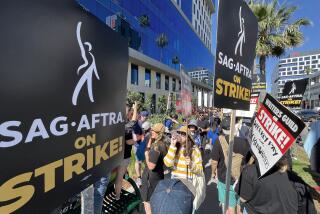Yeltsin, Coal Miners Reach Agreement : Siberia: Two-month strike may end. The Russian Federation is to assume jurisdiction over mines.
- Share via
NOVOKUZNETSK, Soviet Union — Populist leader Boris N. Yeltsin launched his campaign for the powerful new Russian presidency Wednesday by reaching an agreement that could bring an end to the two-month coal miners’ strike.
Standing in front of a crowd of 5,000 workers in the Siberian city of Novokuznetsk, Yeltsin declared his solidarity with the miners and signed a resolution intended to transfer jurisdiction over coal mines to his Russian government.
Drafted by Yeltsin’s aides and strike leaders over two days of negotiations, the resolution pledges that the mines, now controlled by the central government, will be given full independence to decide what kind of management they want once they belong to Russia. This, in turn, should settle most of the miners’ grievances.
“Today, we can firmly say that we have achieved an agreement with which the miners are totally satisfied,” Yeltsin said. “In signing this statement, we are practically signing the . . . mining organizations to the jurisdiction of Russia.”
If the miners do return to work, Yeltsin will likely be credited with achieving what President Mikhail S. Gorbachev could not--resolving one of the country’s most acute economic problems.
Leaders of the strike committees said they expected most of the coal enterprises to return to work after the Soviet and Russian governments finalize the transfer of the mines by signing an agreement on Sunday. A similar process is under way in the Ukraine.
Nearly 100,000 miners, more than 80%, are on strike in the Kuznetsk Coal Basin and have been since March 1. Overall, more than 300,000 miners have been on strike most of the past two months, but there has been a gradual return to work in the past 10 days.
Although the Siberian miners have been the most insistent on their demands, Vyacheslav Golikov, chairman of the Novokuznetsk strike committee, said after the talks with Yeltsin, “When we discussed it fully, we found complete agreement.
“The most important point is complete independence for enterprises,” Golikov said. “First, they give us freedom, and then we determine what kind of ownership.
“What we could not achieve in negotiations with the national government, the Russian government is willing to give us. Naturally, we will deal with the Russian government in the future. We think the national government will agree. What choice will they have?”
Yeltsin said his plan allows the mines to operate independently of the government, remitting taxes and license fees for the coal they mine but keeping 80% of any hard currency they earn. “With this we are approaching social justice, which has not existed for these more than 70 years,” he told the crowd.
Yeltsin’s decision to shun the traditional May Day celebration in Red Square and travel to Novokuznetsk, an industrial center of 700,000 deep in the Siberian coal fields, dramatized both his attempt to woo the country’s rapidly growing independent labor movement and his continuing battle for political power with Gorbachev.
“The miners have turned out to be the initiators of the destruction of the old command-administrative system and the creators of a new system of economic management,” he said. “Those who try to assess the miners’ movement as destructive . . . are deeply mistaken.”
With the conclusion of the agreement with the miners, the trip proved to be an impressive first stump for Yeltsin in his quest to become Russia’s first popularly elected president on June 12.
“It is more interesting here with the miners,” Yeltsin said with a smile, “than standing there next to Gorbachev.”
Yeltsin was nominated for the presidency last weekend by Democratic Russia, a coalition of liberal and radical reform groups claiming a membership of more than 1.3 million. A petition drive began Monday to get more than 100,000 signatures to secure his place on the ballot. His appearance here was his first on the campaign trail.
The venue for Yeltsin’s May Day speech--a dusty asphalt square surrounded by shabby prefabricated apartment blocks--could not have seemed farther from the stately beauty of Red Square, where Gorbachev attended a subdued celebration.
“He won a lot of support by coming here, not only with the miners but with the whole labor movement,” said Alexander I. Kulikov, 33, a miner. “Many miners had the opinion that he had sold out the strike movement, but he came here and explained himself. Now we know his position did not change. He can go to Red Square any time, but today it was important for him to be with us.”
Last week, many miners accused Yeltsin of abandoning them by signing an agreement with Gorbachev and the leaders of eight other republics that called for an end to strikes and allowed the imposition of a strict new regime in key sectors of the economy.
Russian Orthodox priest Gleb Yakunin, a former political dissident who accompanied Yeltsin, said: “This trip is very important for his election campaign. The working class has great influence on the political situation.”
More to Read
Sign up for Essential California
The most important California stories and recommendations in your inbox every morning.
You may occasionally receive promotional content from the Los Angeles Times.












